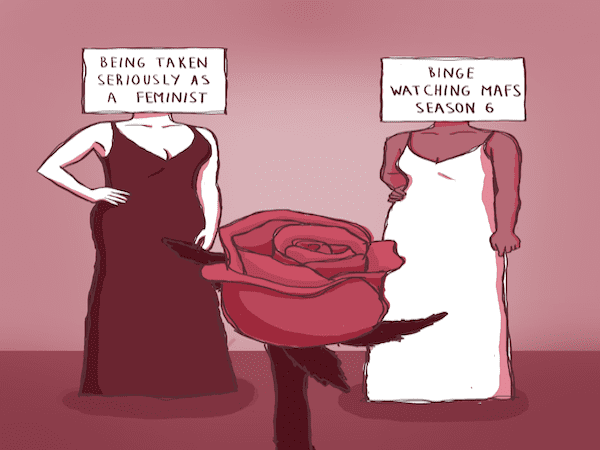A statement that won’t blow your mind: I’m a 21 year old female and a fan of Channel Nine’s spotlight-stealing ratings juggernaut, Married at First Sight. I’m about to tell you why that’s not only okay, but important.
Before you ask, yes, this article did require a significant amount of ‘research’*.
But let’s consider why this is funny. Should I be ashamed of my entertainment tastes simply because they reflect my femininity?
I do understand the criticism – reality television demands pretty low level intellectual engagement in its most self-aware moments, and if we’re honest, there’s a lot of very sexist tropes about women in there. (If I hear the phrase ‘high maintenance’ one more time on MAFS and it’s not about a swanky fridge, I might have an aneurism.)
It’s not the evaluation which concerns me. Rather, it is the foundation of this humour which assigns negative connotations to the femininity of watching reality shows. It is the attitude that sees the female viewer’s empathy, sociability, and eye for the aesthetic, as her superficiality, shallowness, and materialism – and tells us these qualities should be despised.
There’s digs from concerned family members. There’s mocking remarks on social media. There’s articles which make the same, tired jokes about the same, tired women who choose to watch reality television with a glass of chardonnay. In some form, women who ‘confess’ to watching the genre will experience judgement about their preference.
This is no groundbreaking news when the interpretation of women in the media has historically been so problematic. Women are underrepresented and misrepresented in media spaces. Their invisibility both behind and in front of the camera has created a false assumption that the male gaze is the cultural standard and the perspective of women is inferior.
Gradually, the rise of social media is changing this norm. The autonomy it provides has meant that women are able to participate in the process of critiquing and individualising their own representations. In a transforming media landscape, the misrepresentation of women through the male lens has arguably become a more visible concern. Women are continuing to be portrayed in stereotyped modes which perpetuate socially accepted views of their gender.
Considering this, the framing of female traits in reality television viewers has been largely antagonistic in traditional and social media. Audiences are subjected to snide comments and memes on Twitter and Facebook about the superficiality and uselessness of the genre, with humour predicated on how this typifies their gender. I believe this response is not only incredibly sexist but also genuinely false.
Reducing the enjoyment of reality shows to a ‘girl thing’ which is both materialistic and ludicrous, and then demonising these terms, suggests that femininity should be associated with stupidity and shame. This is a dangerous understanding of gender that should not be allowed to continue in the public sphere.
Moreover, whilst the genre exposes viewers to many of the sexist female tropes they despise, the social media engagement around these archetypes provides a unique platform through which they can be dissected and critiqued. Rather than reality shows preventing women from thinking, I’d counter they allow us to develop more relevant, informed social commentary than many other genres – by presenting us with a microcosm of our culture and its gender norms.
With their domination in both ratings and reviews from sites like Buzzfeed and Punkee, reality shows overperform in their contribution to cultural conversations on the social issues they raise. Hashtag-based searches often reveal scathing criticism of the gender-based commentary arising from voiceovers and narrative framing. One meme following a Married at First Sight episode declared, ‘If I hear ‘alpha female’ one more time I will scream’. Interactive discussions like this allow women to directly refute their antagonistic depictions on the small screen, and participate in wider discourse about their representation in contemporary media.
So, go ahead. Lambast me for following a show where pretty women argue over their fake husbands at a fake dinner party under the pretense of wanting true love rather than instagram followers. Laugh at my voyeuristic pleasure in watching ‘relationships’ self-destruct as their participants are utterly, despicably awful to each other in public.
But don’t roll your eyes at the femininity of it all. I’m not ashamed to argue that it’s exactly what makes reality television so important.
*research undertaken with the gals while wearing PJs





